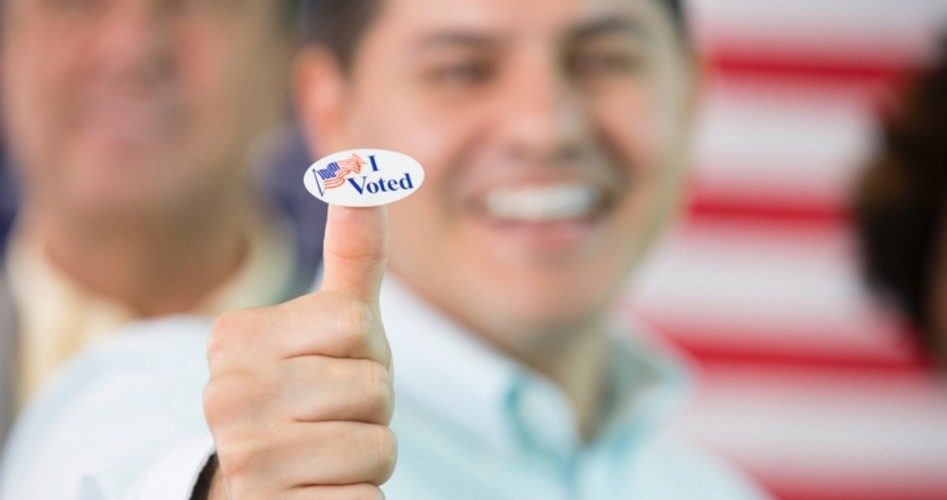
In the next presidential election, Hispanic voters will exceed black voters by six percent.
And that demographic shift isn’t the only news in a Pew report about the 2020 election and who will vote in it.
Reading between the lines shows that immigration is not only the reason for blacks losing second place to whites demographically, but also the reason the electorate is shifting left and headed toward a tipping point that will ensure perpetual Democratic rule.
In other words, for Republicans, the numbers don’t bode well.
Hispanic Ascendency, Foreign Voters
“While demographic changes unfold slowly, it’s already clear that the 2020 electorate will be unique in several ways,” Pew analysts Anthony Cilluffo and Richard Fry wrote. “Nonwhites will account for a third of eligible voters — their largest share ever — driven by long-term increases among certain groups, especially Hispanics.”
The writers anticipate that “Hispanics will be the largest racial or ethnic minority group in the electorate, accounting for just over 13% of eligible voters — slightly more than blacks.”
Hispanics accounted for seven percent of voters in 2000 and nine percent in 2008, yet the black percentage, Cilluffo and Fry wrote, has been constant since 2000 at 12 percent.
But by 2020, Hispanic voters will outnumber black voters 32 million to 30 million, or six percent. Asians too are growing as a portion of the electorate, the writers aver.
But here, for Republicans, is where the trouble lies: At least 33 percent of eligible voters will be nonwhite, up from 25 percent in 2000, largely thanks to immigration. Ten percent of voters in the next election will be foreign-born, the most since 1970, Cilluffo and Fry reported:
The changing racial and ethnic composition of the electorate likely has political implications in part because nonwhites have long been significantly more likely than whites to back Democratic candidates. For instance, in the 2016 election, white voters favored Donald Trump by a 15 percentage point margin, while large majorities of blacks and Hispanics voted for Hillary Clinton.
This truth explains why the Democrats favor open borders and refuse to provide the funding for the border wall President Trump promised. The “migrants,” if not future voters themselves, will bear children who will most likely vote for Democrats.
Hispanic Voting
The numbers partly explain why Republicans feel the urgent need to beg for the Hispanic vote, not least by pandering with ads in Spanish and mindlessly regurgitating the open-borders “nation-of-immigrants” myth.
If they try hard enough, Republicans believe, they can seduce this growing block of voters.
Trump proved that belief without merit in 2016, by winning two percent more of the Hispanic vote than Mitt Romney in 2012, and validated what Heather Mac Donald has explained for years about the GOP’s “Hispanic Delusion.”
“If Republicans want to change their stance on immigration,” she wrote in 2012, “they should do so on the merits, not out of a belief that only immigration policy stands between them and a Republican Hispanic majority.”
“It is not immigration policy that creates the strong bond between Hispanics and the Democratic party,” Mac Donald wrote, but “the core Democratic principles of a more generous safety net, strong government intervention in the economy, and progressive taxation.”
In other words, Hispanics favor leftist policies.
GOP economic policies, she wrote, “were a stronger turn-off for Hispanic voters in California than Republican positions on illegal immigration. Twenty-nine percent of Hispanic voters were suspicious of the Republican Party on class-warfare grounds — ‘it favors only the rich’; ‘Republicans are selfish and out for themselves’; ‘Republicans don’t represent the average person’ — compared with 7 percent who objected to Republican immigration stances.”
Thus must Republicans abandon the fantasy that Hispanics crossing the border are so strong on “family values” they will reject the party of LGBT activism and abortion and vote GOP.
“What Republicans mean by ‘family values’ and what Hispanics mean are two completely different things,” a top Hispanic marketing expert told Mac Donald. “We are a very compassionate people, we care about other people and understand that government has a role to play in helping people.”
And why is that? Mac Donald explained that “U.S.-born Hispanic households in California use welfare programs at twice the rate of native-born non-Hispanic households.”
In other words, if the choice is between free stuff and protecting the lives of the unborn or the sanctity of marriage, free stuff wins.
Image: Steve Debenport via iStock / Getty Images Plus



